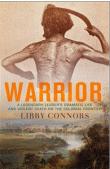 5470991186568830871.jpg
5470991186568830871.jpg
 Warrior : A Legendary Leader's Dramatic Life and Violent Death on the Colonial Frontier
single work
Warrior : A Legendary Leader's Dramatic Life and Violent Death on the Colonial Frontier
single work
 5470991186568830871.jpg
5470991186568830871.jpg
 Warrior : A Legendary Leader's Dramatic Life and Violent Death on the Colonial Frontier
single work
Warrior : A Legendary Leader's Dramatic Life and Violent Death on the Colonial Frontier
single work
'In the 1840s, white settlement in the north was under attack. European settlers were in awe of Aboriginal physical fitness and fighting prowess, and a series of deadly raids on homesteads made even the townspeople of Brisbane anxious.
'Young warrior Dundalli was renowned for his size and strength, and his elders gave him the task of leading the resistance against the Europeans' ever increasing incursions on their traditional lands. Their response was embedded in Aboriginal law and Dundalli became one of their greatest lawmen. With his band of warriors, he had the settlers in thrall for twelve years, evading capture again and again, until he was finally arrested and publicly executed.
'Warrior is the extraordinary story of one of Australia's little-known heroes, one of many Aboriginal men to die protecting their country. It is also a fresh and compelling portrait of life in the early days of white settlement of Brisbane and south east Queensland.' (Source Publisher's website)
This book contains chapters:
Prologue: The public hanging
1. Growing up in the Blackall Range
2. The young negotiator: Trade and diplomacy to March 1842
3. The Great Toors of 1842?43: The Bora men change strategy
4. The attack on Gregor's station
5. White politics and black politics
6. Attempts at conciliation
7. The feud continues: Capture, trial, aftermath
'As most historians know well, Queensland was once part of New South Wales, so the pre-Separation history of the colony is an important period. Unfortunately, not enough work has been done on the ‘Queensland’ frontier before 1859, and many details remain obscure or unknown. Libby Connors’ excellent new book has changed that situation, providing Queenslanders with a remarkably detailed and well-researched account of Brisbane’s early race relations history. There is no longer any excuse for ‘not knowing’ what happened to Aboriginal people in the state’s south-east in those first years of contact.' (Introduction)
'The myth of the warrior looms large in the Australian popular imagination. The young men who served at Gallipoli, at the Western Front and across other fields of battle have not faded from the national consciousness and, in many instances, have been canonised as secular saints. The language of sport is imbued with martial terms; football matches are often described as battles and those playing on the field earn the epithet of ‘warrior’. The display of aggression seen on the playing field is lauded as noble and heroic. The most notable exception to this was seen in 2015 when Aboriginal Australian Football star Adam Goodes was criticised by some for performing a war dance after scoring a goal. For some critics, the warlike display by a proud and strong Aboriginal man was too much to take. The same pride and physicality in the Aboriginal man Dundalli struck fear in the hearts and minds of the European inhabitants in the fledging British settlement of Brisbane and its surrounds. Dundalli came to exemplify the dangers that lay beyond the limits of colonial control. It is the little known story of this man and the resistance of the Dalla, Jagara and Gubbi Gubbi people to European invasion that historian Libby Connors chronicles in Warrior' (Introduction)
'The myth of the warrior looms large in the Australian popular imagination. The young men who served at Gallipoli, at the Western Front and across other fields of battle have not faded from the national consciousness and, in many instances, have been canonised as secular saints. The language of sport is imbued with martial terms; football matches are often described as battles and those playing on the field earn the epithet of ‘warrior’. The display of aggression seen on the playing field is lauded as noble and heroic. The most notable exception to this was seen in 2015 when Aboriginal Australian Football star Adam Goodes was criticised by some for performing a war dance after scoring a goal. For some critics, the warlike display by a proud and strong Aboriginal man was too much to take. The same pride and physicality in the Aboriginal man Dundalli struck fear in the hearts and minds of the European inhabitants in the fledging British settlement of Brisbane and its surrounds. Dundalli came to exemplify the dangers that lay beyond the limits of colonial control. It is the little known story of this man and the resistance of the Dalla, Jagara and Gubbi Gubbi people to European invasion that historian Libby Connors chronicles in Warrior' (Introduction)
'As most historians know well, Queensland was once part of New South Wales, so the pre-Separation history of the colony is an important period. Unfortunately, not enough work has been done on the ‘Queensland’ frontier before 1859, and many details remain obscure or unknown. Libby Connors’ excellent new book has changed that situation, providing Queenslanders with a remarkably detailed and well-researched account of Brisbane’s early race relations history. There is no longer any excuse for ‘not knowing’ what happened to Aboriginal people in the state’s south-east in those first years of contact.' (Introduction)